Publications
Articles, publications, books, tools and multimedia features from the U.S. Institute of Peace provide the latest news, analysis, research findings, practitioner guides and reports, all related to the conflict zones and issues that are at the center of the Institute’s work to prevent and reduce violent conflict.

Motives, Benefits, and Sacred Values: Examining the Psychology of Nonviolent Action and Violent Extremism
What motivates one person to engage in acts of violent extremism, while others choose to pursue change through nonviolent action? This report is based on pilot research into the psychological and social dynamics of a nonviolent resistance group—Algeria’s Hirak movement—that employs some of the same measures used to study participation in violent extremist organizations. A deeper understanding of these dynamics, it is hoped, will help practitioners, policymakers, and researchers to identify and support paths away from violent extremism and to strengthen and sustain engagement in nonviolent action.

Sowing the Seeds of Nonviolent Action in Sudan
From 2013 to 2018, Sudanese civil society actors carved out a variety of civic spaces that laid the foundation for Sudan’s 2018–2019 December Revolution. This report assesses the factors that gave rise to this remarkable mobilization—in particular how civil society development ultimately enabled the Sudanese opposition to sustain a decentralized, nationwide, and robust nonviolent campaign characterized by widespread mass participation, unity of leadership and purpose, and a commitment to nonviolent discipline—and what it will take to keep the country’s democratic transition on track.
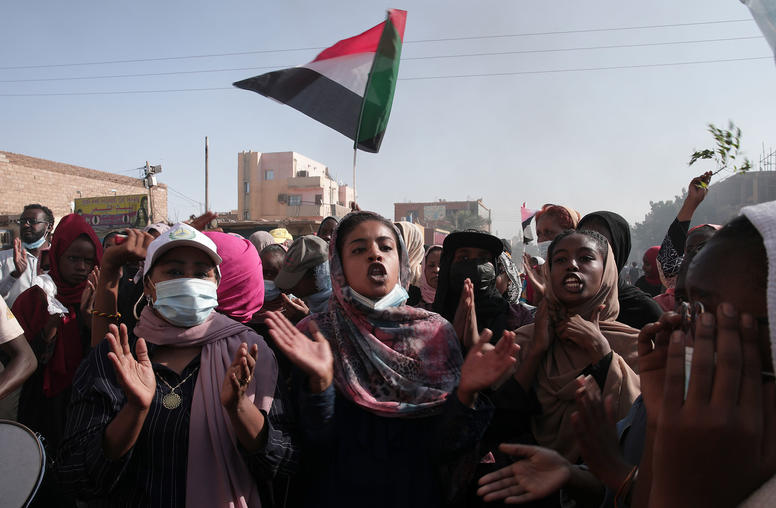
Dissent and Dialogue: The Role of Mediation in Nonviolent Uprisings
While both mediation and nonviolent resistance have been the subject of significant scholarly work, the connection of the two fields has received less attention. Using newly collected data on nonviolent uprisings Africa from the Mediation in Nonviolent Campaigns data set, this report explores several questions: When does mediation occur in the context of nonviolent campaigns? Who tends to mediate? What are the challenges, and what are the outcomes? The study offers overall takeaways, policy conclusions, and recommendations for future research.
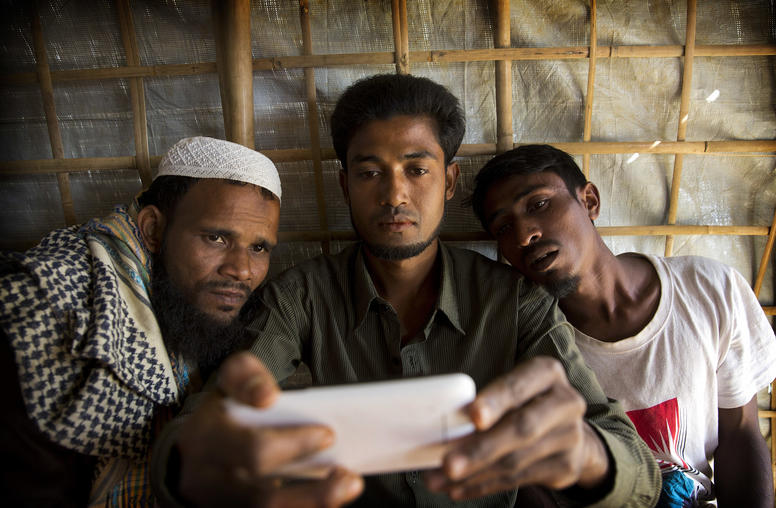
Nonviolent Action in the Era of Digital Authoritarianism: Hardships and Innovations
In the late 2000s and early 2010s, nonviolent action movements employed social media and other digital tools to orchestrate pro-democracy uprisings that took regimes by surprise. Those euphoric early days have since given way to digital repression, restricted online freedoms, and democratic backsliding as authoritarian regimes leverage new technologies to surveil the opposition and sow misinformation. This report documents how nonviolent activists are adapting to digital repression and suggests ways the United States and its allies can slow the pace of autocratic innovation in the use of these technologies.
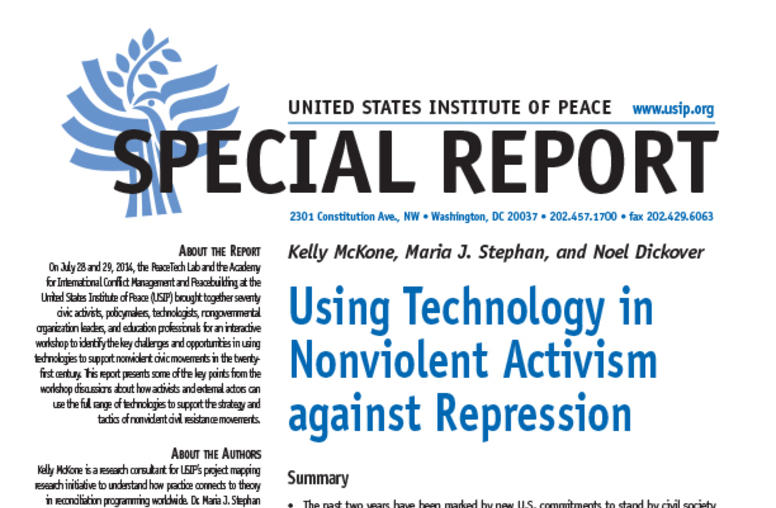
Using Technology in Nonviolent Activism against Repression
In an era of crackdowns on freedoms of peaceful assembly and association, what role can technology play in strengthening nonviolent civic mobilization? How can activists strategically apply the full range of technologies to build and sustain movements where the options for nonviolently resolving conflicts are diminishing under increased repression? Informed by discussions from a USIP workshop, this report explores avenues for engagement between activists and external actors to use technology ...
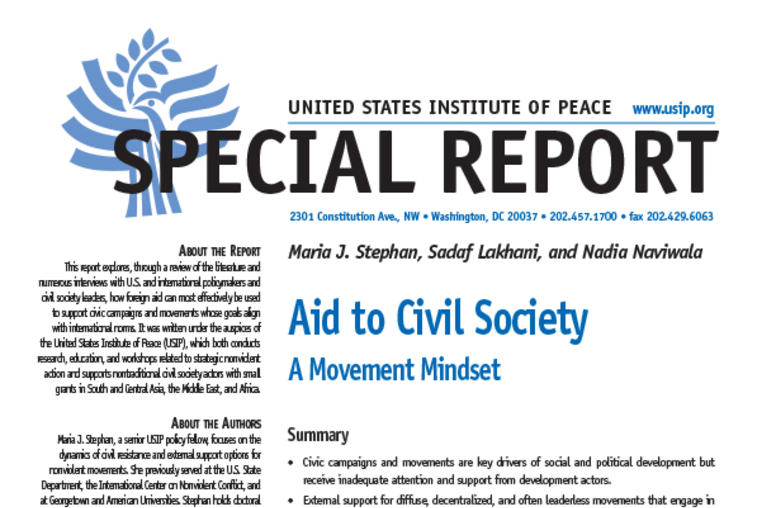
Aid to Civil Society: A Movement Mindset
Supporting local agents of nonviolent change is critical to preventing violent conflict and advancing democratic development. Civic campaigns are key drivers of social and political development, as is clear from issues-focused movements in Central and Eastern Europe, Latin America, and most recently the Middle East and North Africa. Effectively aiding civic movements that are fluid, diverse, decentralized, and often loosely organized is tricky. Drawn from a review of the literature and numero...
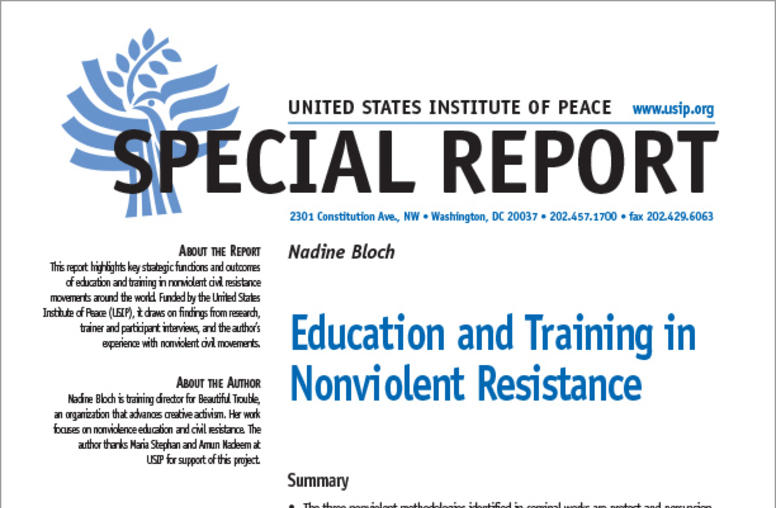
Education and Training in Nonviolent Resistance
Civil society around the world has demonstrated the ability to bring about change without violence. Critical to civil society’s success is preparing communities to undertake safe and strategic nonviolent action (NVA) movements. Previous research on NVA has focused on three broad methodologies: protest and persuasion, noncooperation, and intervention. This Report contributes to the knowledge on NVA by highlighting key strategic functions and outcomes of education and training–a fourth and crit...
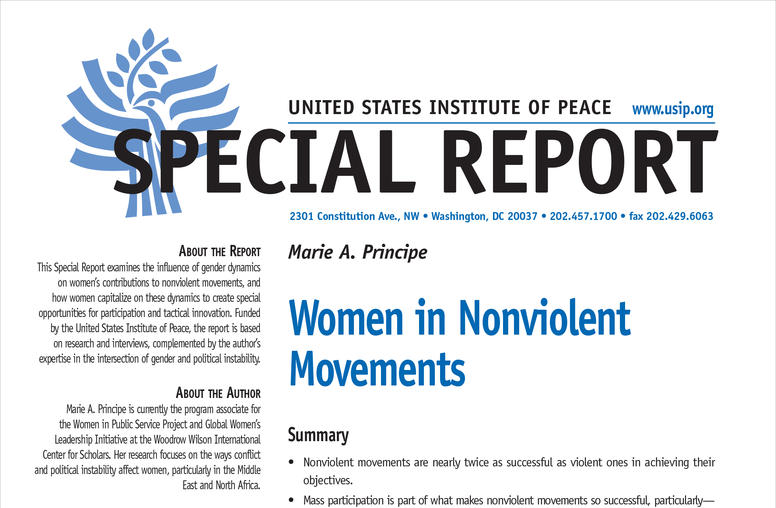
Women in Nonviolent Movements
Women’s meaningful involvement in civil resistance movements has shown to be a game changer. Examining movements in Argentina, Chile, Egypt, Liberia, the Palestinian territories, Poland, Syria, and the United States, this report advocates for the full engagement of women and their networks in nonviolent movements for a simple and compelling reason—because greater female inclusion leads to more sustainable peace.
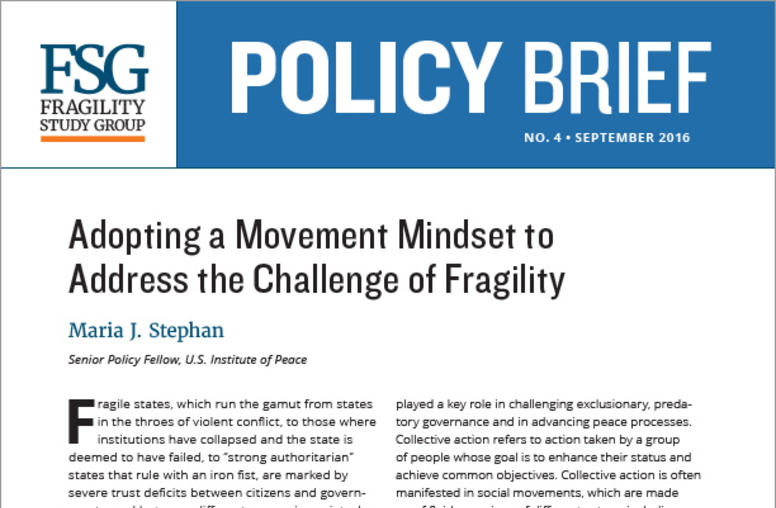
Adopting a Movement Mindset to Address the Challenge of Fragility
The Fragility Study Group is an independent, non-partisan, effort of the Carnegie Endowment for International Peace, the Center for a New American Security and the United States Institute of Peace. The chair report of the study group, U.S. Leadership and the Challenge of State Fragility, was released on September 12. This brief is part of a series authored by scholars from the three institutions that build on the chair report to discuss the implications of fragility on existing U.S. tools, st...
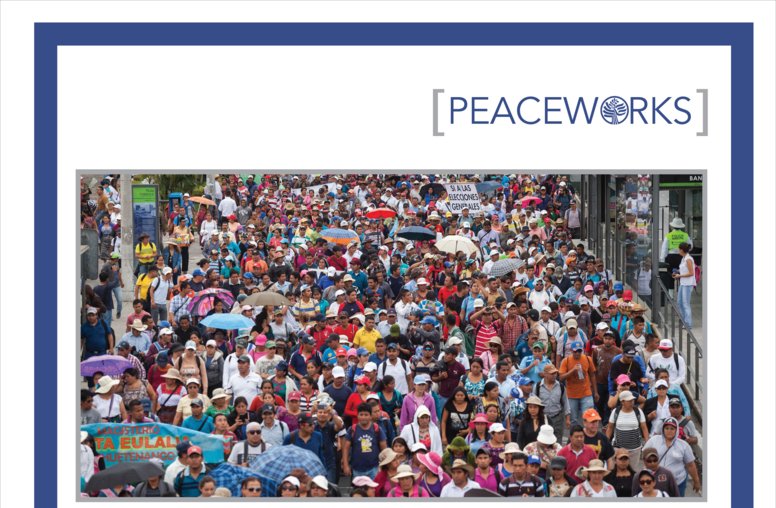
Negotiating Civil Resistance
Reviewing the literature on negotiation and civil resistance, this report examines the current divide between the two and digs deeper to identify the fundamental convergences. It builds on these findings to illustrate why negotiations and negotiation concepts are essential to the success of civil resistance campaigns. Using historical examples, it then examines the dynamics of negotiation in the context of these strategic domains.